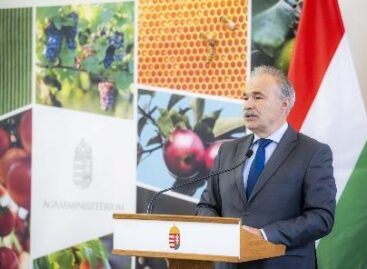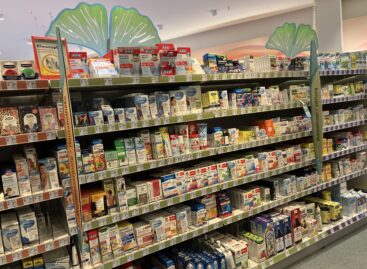Magazine: Business Dinner 2021: ‘After 30 years Hungarian groceries are still respected abroad’
Trade magazin organised its annual Business Dinner at the end of June.

Szilvia Krizsó
host
The event’s host was Szilvia Krizsó, who discussed what the food industry will be like in 2050 with guests Péter Cseresnyés, state secretary for consumer protection and trade policy of the Ministry for Innovation and Technology, Tamás Éder, president of the Federation of Responsible Food Manufacturers (FÉSZ) and vice president of the Hungarian Chamber of Agriculture (NAK) and Gergő Soltész, member of the board of directors at Takarékbank.
Péter Cseresnyés is hopeful that the proportion of Hungarian food products available in stores will increase, and that the food industry background will also make progress. He revealed that currently less than 50 percent of the groceries sold in shops are Hungarian, and the government wants this proportion to grow to 70-80 percent.
Generation change: pros and cons

Tamás Éder
president of FÉSZ
and vice president of NAK
Tamás Éder’s view is that the food market is going in two directions: one with food that is natural, local, comes from a short supply chain and sort of luxury category, and a mass food supply that is smarter, better structured and more personalised than the present one.
Gergő Soltész pointed it out: while 40-45 percent of companies don’t survive the generation change, those who do will get access to the markets of firms that went out of business, so a kind of concentration process takes place. He added that it is very important for the Hungarian food industry to strengthen further in export markets – state financing can play a crucial role in this.
Good applicants, bad applicants
FÉSZ’s president informed that lots of grant money is available for food companies. Applications are judged using a method with which anyone could win if the paperwork is done well. This is where the responsibility of banks come into the picture: they should avoid financing projects that are unreasonably big, unnecessary or seek to realise niche market goals only.

At this year’s Business Dinner, we were pondering the future
Staying in the competition

Péter Cseresnyés
secretary for consumer
protection and trade policy
of the Ministry for Innovation
and Technology
Mr Cseresnyés stressed in connection with the influx of state money in the sector that the objective is to make Hungarian food products available to as many consumers as possible. As part of this process, Hungarian-owned stores and retail, chains need to be strengthened, so that they can stay competitive against multinational retailers. In the Hungarian Village programme the government will spend HUF 50 billion on this.
Mr Éder thinks that until 2016 most of the funding went into agricultural production and the food industry was neglected. He hopes that in the next budgetary cycle there will be enough funding for building up food companies that are capable of quality mass production, putting our groceries that can be competitive in the international market too.

Gergő Soltész
member of the board
of directors Takarékbank
Mr Soltész added that the market presence of Hungarian food products is influenced by two factors. One of them is that the contribution of retail chains to entering export markets is becoming more significant. The other is that suppliers should do their best – with high product quality and nice packaging – to be in a position where they can ask for a price for their products from retailers which keeps them competitive.
Mass production vs. local food
The secretary of state underlined the fact that multinational retail chains are also considered important partners in the government’s strategy, as they sell a high proportion of Hungarian products too. In connection with the balance between competitiveness and climate protection he told: although mass production is key in the food industry, if a product can be substituted with a locally produced one, he will buy that – even more so, because he wants to support the person behind the given product. //
Related news
Sino-Hungarian agricultural relations continue to strengthen
Hungarian agriculture and agribusiness have faced numerous challenges recently, but…
Read more >The future has already begun – thoughts on Innovation Day
How will innovations shape the future of retail and the…
Read more >Hungary may declare exemption from foot-and-mouth disease at the end of May
No new cases have been detected since the last outbreak…
Read more >Related news
WHO: They urge a 50 percent price increase for tobacco, alcohol and sugary drinks
The World Health Organization (WHO) is calling for the prices…
Read more >Eurozone economic growth accelerated in June
The eurozone’s economic performance accelerated in June, according to the…
Read more >This is how drug prices are changing: the government introduced price restrictions
The Ministry of National Economy’s price restrictions on medicines came…
Read more >






